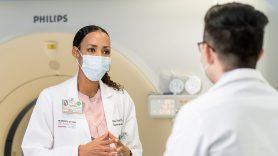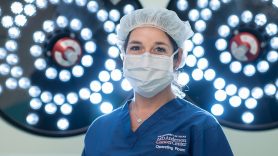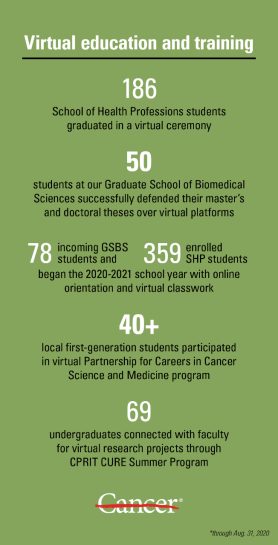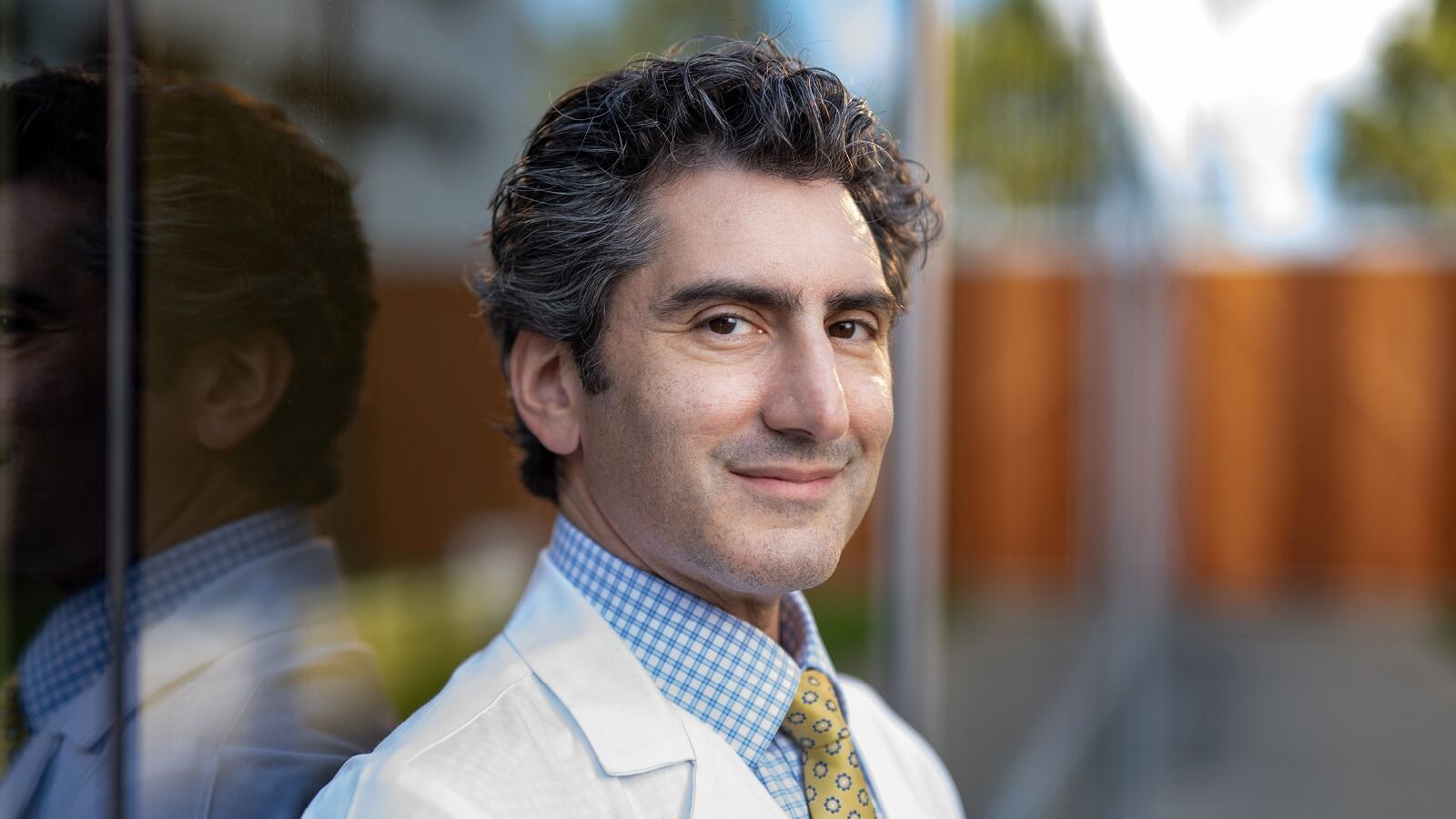- Diseases
- Acoustic Neuroma (14)
- Adrenal Gland Tumor (24)
- Anal Cancer (68)
- Anemia (2)
- Appendix Cancer (16)
- Bile Duct Cancer (26)
- Bladder Cancer (72)
- Brain Metastases (28)
- Brain Tumor (232)
- Breast Cancer (714)
- Breast Implant-Associated Anaplastic Large Cell Lymphoma (2)
- Cancer of Unknown Primary (4)
- Carcinoid Tumor (8)
- Cervical Cancer (158)
- Colon Cancer (166)
- Colorectal Cancer (116)
- Endocrine Tumor (4)
- Esophageal Cancer (44)
- Eye Cancer (36)
- Fallopian Tube Cancer (8)
- Germ Cell Tumor (4)
- Gestational Trophoblastic Disease (2)
- Head and Neck Cancer (12)
- Kidney Cancer (128)
- Leukemia (342)
- Liver Cancer (50)
- Lung Cancer (286)
- Lymphoma (278)
- Mesothelioma (14)
- Metastasis (30)
- Multiple Myeloma (100)
- Myelodysplastic Syndrome (60)
- Myeloproliferative Neoplasm (4)
- Neuroendocrine Tumors (16)
- Oral Cancer (100)
- Ovarian Cancer (172)
- Pancreatic Cancer (160)
- Parathyroid Disease (2)
- Penile Cancer (14)
- Pituitary Tumor (6)
- Prostate Cancer (146)
- Rectal Cancer (58)
- Renal Medullary Carcinoma (6)
- Salivary Gland Cancer (14)
- Sarcoma (238)
- Skin Cancer (296)
- Skull Base Tumors (56)
- Spinal Tumor (12)
- Stomach Cancer (64)
- Testicular Cancer (28)
- Throat Cancer (92)
- Thymoma (6)
- Thyroid Cancer (96)
- Tonsil Cancer (30)
- Uterine Cancer (80)
- Vaginal Cancer (16)
- Vulvar Cancer (20)
- Cancer Topic
- Adolescent and Young Adult Cancer Issues (20)
- Advance Care Planning (10)
- Biostatistics (2)
- Blood Donation (18)
- Bone Health (8)
- COVID-19 (362)
- Cancer Recurrence (120)
- Childhood Cancer Issues (120)
- Clinical Trials (630)
- Complementary Integrative Medicine (22)
- Cytogenetics (2)
- DNA Methylation (4)
- Diagnosis (232)
- Epigenetics (6)
- Fertility (62)
- Follow-up Guidelines (2)
- Health Disparities (14)
- Hereditary Cancer Syndromes (126)
- Immunology (18)
- Li-Fraumeni Syndrome (8)
- Mental Health (116)
- Molecular Diagnostics (8)
- Pain Management (62)
- Palliative Care (8)
- Pathology (10)
- Physical Therapy (18)
- Pregnancy (18)
- Prevention (914)
- Research (392)
- Second Opinion (74)
- Sexuality (16)
- Side Effects (604)
- Sleep Disorders (10)
- Stem Cell Transplantation Cellular Therapy (216)
- Support (402)
- Survivorship (320)
- Symptoms (182)
- Treatment (1786)
Training future oncologists and cancer researchers during the pandemic: Two educators' stories
3 minute read | Published December 21, 2020
Medically Reviewed | Last reviewed by an MD Anderson Cancer Center medical professional on December 21, 2020
Training the next generation of cancer researchers and clinicians plays a vital role in MD Anderson’s mission to end cancer. While our educators had to get creative and adapt quickly when the coronavirus pandemic arrived, they didn’t waver in their dedication to setting our trainees up for success.
Here’s how two of our educators have adapted to share knowledge and support our trainees during the COVID-19 pandemic.
Embracing the possibilities of going virtual
For cardiothoracic surgeon Mara Antonoff, M.D., journal club meetings play a vital role in training. Five years ago, Antonoff decided to take a new approach to the thoracic surgery monthly meetings at MD Anderson. Previously, trainees had presented published research articles there for discussion. But that strategy was limited in both the breadth and depth of material covered. So, why not assign them controversial patient scenarios instead, and ask them to defend their proposed solutions in a debate-style forum?
“There were so many advantages to having our meetings this way,” says Antonoff. “First, it enabled our trainees to explore numerous papers on a given topic, rather than just one. Second, it allowed them to apply those papers to an actual patient situation. And third, because trainees defended their choices using the latest evidence-based data and literature, our faculty were able to provide them with feedback and expert opinions.”
The new meeting format proved so successful that Antonoff and her team published an article about it in 2017, and shared the curriculum through the Thoracic Education Cooperative Group. Soon, educators from around the country were re-creating the same thing at their own institutions.
But then, COVID-19 forced the cancellation of the March and April meetings. The fate of the remaining 2020 meetings was in question, too. That’s when Antonoff had a realization: if she conducted the May meeting as a webinar, she wouldn’t have to cancel it.
“In a virtual setting, we could have all of our own faculty on hand, plus colleagues and specialists from other locations and institutions,” she says. “Anyone we invited could attend, no matter where they were. And, we could showcase our training programs, too, by demonstrating all the opportunities aspiring thoracic surgeons could have if they came here.”

Re-envisioning residency -- from start to the very end
Graduation ceremonies for many organizations looked very different this past summer. MD Anderson was no exception.
To ensure residents graduating from our Radiation Oncology residency program still got to mark this milestone, Chelsea Pinnix, M.D., Ph.D., and her colleagues got creative.
“We organized a drive-by, socially distanced parade in June,” says Pinnix, who leads our Radiation Oncology residency program. “Faculty and residents formed a caravan and drove past the homes of our new graduates in decorated cars. We also had an online ceremony where we created personalized emojis for a virtual graduate procession, integrated video well-wishes from their family and friends, and invited their loved ones from all around the world to join us.”
MD Anderson educators have been making the most of virtual technology in the classroom, too, giving many resident physicians the ability to work entirely remotely in the earliest days of the pandemic. For new Radiation Oncology residents who started this past summer, onboarding was almost entirely virtual.
“Thankfully, with the safeguards implemented by MD Anderson, our trainees were able to resume in-person clinical rotations,” says Pinnix. “They are now able to interact directly with supervising faculty members while participating in the care of our patients.”
Learn more about Education and Training at MD Anderson.

In a virtual setting, we could have all of our own faculty on hand, plus colleagues and specialists from other locations and institutions.
Mara Antonoff, M.D.
Physician






